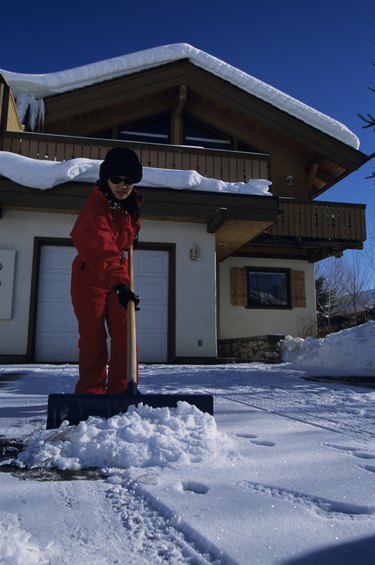
Removing snow and ice from a driveway is a labor-intensive process with cold, wet conditions, but putting the task off leads to a dangerous and slippery driveway. You can get a head start by pretreating a driveway with a deicing agent to prevent snow from freezing up when it hits the ground. Anti-icing materials lower the freezing point of snow and sleet, making it easier for you to clear the driveway before heavy snow freezes.
De-icing Agents
Video of the Day
You can make your own deicing solutions by dissolving deicing salts in warm water. Deicing salts include rock salt and urea salt. Urea is also used as a natural fertilizer. It melts ice in temperatures over 15 degrees Fahrenheit. Other deicing agents include sodium chloride, potassium chloride and magnesium chloride. They work in temperatures above 12 to 25 degrees Fahrenheit and are available as liquid solutions or can be mixed with warm water. Calcium chloride is a pricier option, but it continues to work down to -25 degrees Fahrenheit.
Video of the Day
Application
Creating and applying deicing agents to a driveway before it snows is simple. Wait to dissolve the agent in warm water until about two hours before the projected snowfall. Pour the agent into a spray bottle or spray canister. Begin at the garage end of the driveway and spray the solution over the entire surface, adding an extra coat at the street end of the driveway. The liquid will dry on the pavement and remain there once you begin shoveling, unlike loose salts or flakes that get scooped up with the snow shovel.
Considerations
While pretreating a driveway helps you maintain safe conditions for cars and foot traffic, the solutions can do damage when not used in moderation. For instance, salt, urea and potassium chloride are corrosive to pavement, metal, plant life and even drinking water in some localities. Plan to rinse off the solutions once the snow is cleared and temperatures rise. Direct the water toward the street so that it won't harm the lawn.
Add Traction
Coating a driveway with a deicing agent will melt the first layer of snow, but the melted water and top layers of snow makes slushy, slippery conditions. To create traction, scatter loose alfalfa meal over the pavement. This natural fertilizer is dry and gritty. It helps melt ice without posing a danger to plants and drinking water, as long as it's used moderately.